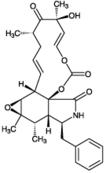Replaces Prod. #: ALX-380-062
An aspergillus derived fungal metabolite. Inhibits angiogenesis and tumor growth. An actin microfilament depolymerizing agent.
Product Details
| Formula: | C28H33NO7 |
| |
| MW: | 495.6 |
| |
| Source: | Isolated from Aspergillus clavatus |
| |
| CAS: | 36011-19-5 |
| |
| Purity: | ≥98% (HPLC, TLC) |
| |
| Appearance: | White solid. |
| |
| Solubility: | Soluble in DMSO (50mg/ml) or ethyl acetate (5mg/ml) |
| |
| Shipping: | Ambient Temperature |
| |
| Long Term Storage: | -20°C |
| |
| Use/Stability: | Store, as supplied, at -20°C for up to 1 year. Store solutions at -20°C for up to 3 months. |
| |
| Handling: | Protect from light. |
| |
| Regulatory Status: | RUO - Research Use Only |
| |
Please mouse over
Product Literature References
Depolymerization of actin filament by cytochalasin E induces interleukin-8 production and up-regulates CD54 in the HeLa epithelial cell line: N. Ikewai et al.; Microbiol. Immunol.
47, 775 (2003),
Abstract;
Actin depolymerization and polymerization are required during apoptosis in endothelial cells: N. Suarez-Huerta et al.; J. Cell. Physiol.
184, 239 (2000),
Abstract;
Cytochalasin E, an epoxide containing Aspergillus-derived fungal metabolite, inhibits angiogenesis and tumor growth: T. Udagawa et al.; J. Pharmacol. Exp. Ther.
294, 421 (2000),
Abstract;
Cytochalasin-E-Resistant Mutants of Coprinus cinereus: Isolation and Genetic, Biochemical, and Cytological Analyses: M. Tsukamoto et al.; Fungal Genet. Biol.
20, 52 (1996),
Abstract;
Inhibition of actin polymerization in blood platelets by cytochalasins: J.E. Fox & D.R. Phillips; Nature
292, 650 (1981),
Abstract;












